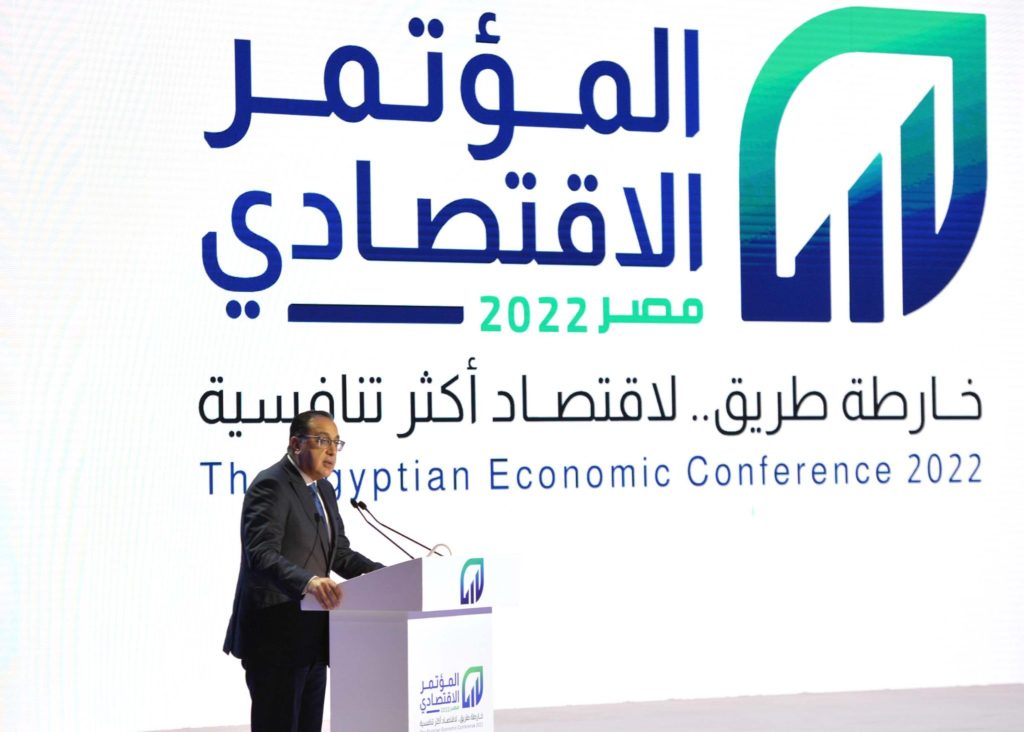Cairo – The Egyptian Economic Conference, held by the country’s government this week, closed with a series of guidelines grouped into a roadmap for advancing the Egyptian economy. The document covers several main axes, including support for industry and exports, the role of the private sector, priority economic sectors, and fiscal and monetary policies.
The recommendations concerning fiscal and monetary policies included the continuation of the effort to reduce the public debt to Gross Domestic Product (GDP) ratio, lengthening its payment term, continuing to produce a primary surplus to increase the capacity of the state to pay its duties and revving the agreement with the International Monetary Fund (IMF).
The roadmap stressed the importance of exchange rate flexibility to reflect supply and demand market dynamics and as a tool for absorbing external impacts. It also highlighted the importance of working to stimulate the derivatives market as a protection tool against exchange rate fluctuation risks. Another measure was the creation of a new index for the Egyptian pound, based on some currencies of the most important trading partners and gold.
Concerning the development of the industrial sector, the recommendations included the rapid implementation of an integrated strategic framework for the national industry. The project focuses on some essential industries and deepening local production, especially in engineering, chemicals, textiles, and food, in addition to stimulating the development of industrial exports through programs to refund export charges.
The guidelines include improving mechanisms for accessing new markets, bolstering the role of commercial offices abroad, and promoting international trade shows. A proposed strategy mentions improving the regulations on preference for local products, intending to boost national production. Another proposes transforming industrial areas into integrated residential cities by granting factories land and providing workers housing, reducing transportation costs.
Imports
Egyptian Prime Minister Mostafa Madbouly (opening picture) announced the cancellation of the 60-day import letter of credit requirement in response to demands from Egyptian manufacturers and a 55% income refund for strategic industries for 45 days. He also announced adjusting the preference law for domestic products in government contracts and preparing the new phase of export charges refunds worth EGP 5.5 billion (about USD 278 million at the current rate).

The guidelines included expanding the partner base as a priority focus in the stock exchange IPOs, followed by capital growth through strategic investors. The document provides for the strengthening of Egypt’s sovereign wealth fund role with the transfer of several state-owned companies. Another recommendation was to speed up the distribution of export subsidies to eligible sectors once the supporting documents were presented.
The recommendations made during the conference included reforming the system of cooperatives and unions linked to agricultural activity through structural, institutional, financial, and administrative modifications. The aim is to support the sector’s ability to play a more significant role in food security. It was also proposed the creation of faster transportation lines to speed up the flow of fresh agricultural exports to target markets, considering these products are perishable, focusing on destinations with greater weight in the nation’s agricultural exports.
The guidelines also included facilitating access to financing for projects in the health area, especially in new communities, with subsidized loans and special interest rates. The importance of facilitating partnership procedures with the state for the management of existing and new hospitals was also highlighted through the private control of health units under the franchise system and the offering of integrated fiscal and financial package incentives in the sector.
The conference recommended studying the introduction of changes in the electricity supply contracts for plants subject to bank financing. It also guided organizational measures to allow the sale of real estate abroad, the promotion of real estate products, and the establishment of a special economic zone for the high-tech Information and Communication Technology industry in the short term.
Transportation
The economic conference’s recommendations included expanding local manufacturing of rail and electrically-powered transport units and their replacement parts to create a reliable industrial base and a strong currency. Another recommendation was to seek the involvement of the Egyptian and foreign private sectors in the management and operation of all transport facilities, working to amend legislation, policies, and regulations.
Translated by Georgette Merkhan & Elúsio Brasileiro




